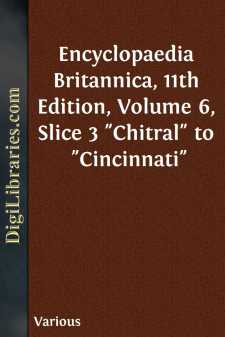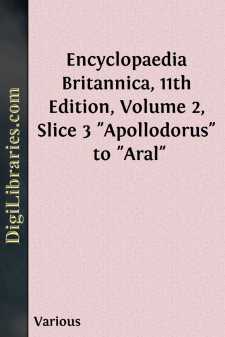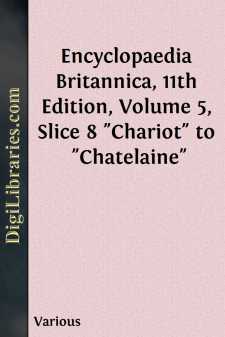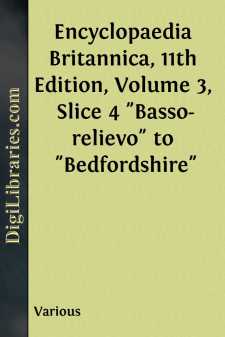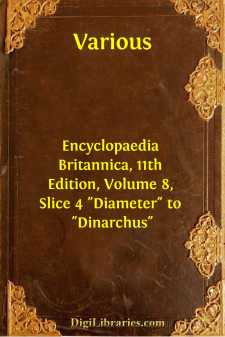Reference
- Atlases 1
- Bibliographies & Indexes 10
- Catalogs 55
- Dictionaries 1
- Encyclopedias
- Etiquette 14
- Handbooks & Manuals 19
- Heraldry 2
- Quotations 9
Encyclopedias Books
Sort by:
by:
Various
CHITRAL, a native state in the North-West Frontier Province of India. The state of Chitral (see also ) is somewhat larger than Wales, and supports a population of about 35,000 rough, hardy hillmen. Previous estimates put the number far higher, but as the Mehtar assesses his fighting strength at8000 only, this number is probably not far wrong. Both the state and its capital are called Chitral, the...
more...
by:
Various
APOLLODORUS, an Athenian painter, who flourished at the end of the 5th century B.C. He is said to have introduced great improvements in perspective and chiaroscuro. What these were it is impossible to say: perspective cannot have been in his day at an advanced stage. Among his works were an Odysseus, a priest in prayer, and an Ajax struck by lightning. APOLLODORUS, an Athenian grammarian, pupil of...
more...
by:
Various
CARNEGIE, ANDREW (1837- ), American “captain of industry” and benefactor, was born in humble circumstances in Dunfermline, Scotland, on the 25th of November 1837. In 1848 his father, who had been a Chartist, emigrated to America, settling in Allegheny City, Pennsylvania. The raw Scots lad started work at an early age as a bobbin-boy in a cotton factory, and a few years later was engaged as a...
more...
by:
Various
CONDUCTION, ELECTRIC. The electric conductivity of a substance is that property in virtue of which all its parts come spontaneously to the same electric potential if the substance is kept free from the operation of electric force. Accordingly, the reciprocal quality, electric resistivity, may be defined as a quality of a substance in virtue of which a difference of potential can exist between different...
more...
by:
Various
AUSTRIA, LOWER (Ger. Niederösterreich or Österreich unter der Enns, "Austria below the river Enns"), an archduchy and crownland of Austria, bounded E. by Hungary, N. by Bohemia and Moravia, W. by Bohemia and Upper Austria, and S. by Styria. It has an area of 7654 sq. m. and is divided into two parts by the Danube, which enters at its most westerly point, and leaves it at its eastern...
more...
by:
Various
CHARIOT(derived from an O. Fr. word, formed fromchar, a car), in antiquity, a conveyance (Gr.á¼â¦ρμα, Lat.currus) used in battle, for the chase, in public processions and in games. The Greek chariot had two wheels, and was made to be drawn by two horses; if a third or, more commonly, two reserve horses were added, they were attached on each side of the main pair by a single trace fastened...
more...
by:
Various
BASSO-RELIEVO (Ital. for âlow reliefâ), the term applied to sculpture in which the design projects but slightly from the plane of the background. The relief may not project at all from the original surface of the material, as in the sunken reliefs of the Egyptians, and may be nearly flat, as in the Panathenaic procession of the Parthenon. In the early 19th century the term basso-relievo, or...
more...
by:
Various
BANKS, GEORGE LINNAEUS (1821-1881), British miscellaneous writer, was born at Birmingham on the 2nd of March 1821. After a brief experience in a variety of trades, he became at the age of seventeen a contributor to various newspapers, and subsequently a playwright, being the author of two plays, a couple of burlesques and several lyrics. Between 1848 and 1864 he edited in succession a variety of...
more...
by:
Various
DIAMETER (from the Gr. διì, through, μÃτρον, measure), in geometry, a line passing through the centre of a circle or conic section and terminated by the curve; the “principal diameters” of the ellipse and hyperbola coincide with the “axes” and are at right angles; “conjugate diameters” are such that each bisects chords parallel to the other. The diameter of a quadric...
more...
by:
Various
INITIALS USED IN VOLUME IV. TO IDENTIFY INDIVIDUALCONTRIBUTORS, WITH THE HEADINGS OF THEARTICLES IN THIS VOLUME SO SIGNED.A. B. R.Alfred Barton Rendle, F.R.S., F.L.S., M.A., D.Sc.Keeper of the Department of Botany, British Museum.{Botany.A. E. H.A. E. Houghton.Formerly Correspondent of theStandardin Spain. Author ofRestoration of the Bourbons in Spain.{Cabrera.A. E. S.Arthur Everett Shipley, F.R.S.,...
more...


